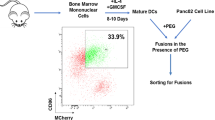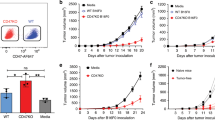Abstract
Background
Pancreas cancer–bearing mice have an increased prevalence of immunosuppressive CD4+CD25+ regulatory T cells (Treg). Depletion of Treg results in smaller tumors and prolonged host survival. The objective of this study was to evaluate the tumor-specific immune response after depletion of Treg alone or in combination with a cancer vaccine.
Methods
Four groups of C57BL/6 mice were challenged with pancreas adenocarcinoma cells (Pan02). The mice received four combinations of antibody-mediated Treg depletion and whole tumor cell vaccination: (1) no treatment, (2) Treg depletion only, (3) vaccination only, or (4) Treg depletion and vaccination. Splenocytes and lymphocytes from tumor-draining lymph nodes were analyzed for tumor-specific release of interferon γ by enzyme-linked immunosorbent spot assay.
Results
In Treg-depleted and vaccinated mice, a strong statistical trend toward smaller tumors (P = .05) and longer survival (P = .054) was found compared with untreated mice. Treg-depleted mice showed significantly more tumor-specific cells than undepleted mice (P = .02). The number of tumor-specific cells was significantly higher in tumor-draining lymph nodes than in the spleen (P = .002). Similarly, significantly more tumor-specific cells were found in spleens of Treg-depleted and vaccinated mice than in vaccinated-only mice (P = .009).
Conclusions
Depletion of Treg alone or in combination with a whole tumor cell vaccine promotes a tumor-specific immune response. Thus, strategies incorporating Treg depletion might improve the efficacy of cancer vaccines.




Similar content being viewed by others
References
Takahashi T, Kuniyasu Y, Toda M, et al. Immunologic self-tolerance maintained by CD25+CD4+ naturally anergic and suppressive T cells: induction of autoimmune disease by breaking their anergic/suppressive state. Int Immunol 1998;10:1969–80
Shevach EM, McHugh RS, Thornton AM, Piccirillo C, Natarajan K, Margulies DH. Control of autoimmunity by regulatory T cells. Adv Exp Med Biol 2001;490:21–32
Kojima A, Tanaka-Kojima Y, Sakakura T, Nishizuka Y. Spontaneous development of autoimmune thyroiditis in neonatally thymectomized mice. Lab Invest 1976;34:550–7
Stumbles PA, Penhale WJ. IDDM in rats induced by thymectomy and irradiation. Diabetes 1993;42:571–8
Kontani K, Taguchi O, Takahashi T. Involvement of the H+/K(+)-ATPase alpha subunit as a major antigenic protein in autoimmune gastritis induced by neonatal thymectomy in mice. Clin Exp Immunol 1992;89:63–7
Kojima A, Sakakura T, Tanaka Y, Nishizuka Y. Sterility in neonatally thymectomized female mice: its nature and prevention by the injection of spleen cells. Biol Reprod 1973;8:358–61
Malmstrom V, Shipton D, Singh B, et al. CD134L expression on dendritic cells in the mesenteric lymph nodes drives colitis in T cell-restored SCID mice. J Immunol 2001;166:6972–81
Thornton AM, Shevach EM. Suppressor effector function of CD4+CD25+ immunoregulatory T cells is antigen nonspecific. J Immunol 2000;164:183–90
Piccirillo CA, Shevach EM. Cutting edge: control of CD8+ T cell activation by CD4+CD25+ immunoregulatory cells. J Immunol 2001;167:1137–40
Azuma T, Takahashi T, Kunisato A, Kitamura T, Hirai H. Human CD4+ CD25+ regulatory T cells suppress NKT cell functions. Cancer Res 2003;63:4516–20
Powrie F, Carlino J, Leach MW, Mauze S, Coffman RL. A critical role for transforming growth factor-beta but not interleukin 4 in the suppression of T helper type 1-mediated colitis by CD45RB(low) CD4+ T cells. J Exp Med 1996;183:2669–74
Seddon B, Mason D. Regulatory T cells in the control of autoimmunity: the essential role of transforming growth factor beta and interleukin 4 in the prevention of autoimmune thyroiditis in rats by peripheral CD4(+)CD45RC- cells and CD4(+)CD8(−) thymocytes. J Exp Med 1999;189:279–88
Dieckmann D, Plottner H, Berchtold S, Berger T, Schuler G. Ex vivo isolation and characterization of CD4(+)CD25(+) T cells with regulatory properties from human blood. J Exp Med 2001;193:1303–10
Hori S, Nomura T, Sakaguchi S. Control of regulatory T cell development by the transcription factor Foxp3. Science 2003;299:1057–61
Wolf AM, Wolf D, Steurer M, Gastl G, Gunsilius E, Grubeck-Loebenstein B. Increase of regulatory T cells in the peripheral blood of cancer patients. Clin Cancer Res 2003;9:606–12
Woo EY, Chu CS, Goletz TJ, et al. Regulatory CD4(+)CD25(+) T cells in tumors from patients with early-stage non-small cell lung cancer and late-stage ovarian cancer. Cancer Res 2001;61:4766–72
Sasada T, Kimura M, Yoshida Y, Kanai M, Takabayashi A. CD4 + CD25 + regulatory T cells in patients with gastrointestinal malignancies: possible involvement of regulatory T cells in disease progression. Cancer 2003;98:1089–99
Curiel TJ, Coukos G, Zou L, et al. Specific recruitment of regulatory T cells in ovarian carcinoma fosters immune privilege and predicts reduced survival. Nat Med 2004;10:942–9
Awwad M, North RJ. Cyclophosphamide-induced immunologically mediated regression of a cyclophosphamide-resistant murine tumor: a consequence of eliminating precursor L3T4+ suppressor T-cells. Cancer Res 1989;49:1649–54
North RJ, Dye ES. Ly 1 + 2- suppressor T cells down-regulate the generation of Ly 1-2+ effector T cells during progressive growth of the P815 mastocytoma. Immunology 1985;54:47–56
Rakhmilevich AL, North RJ, Dye ES. Presence of CD4+ T suppressor cells in mice rendered unresponsive to tumor antigens by intravenous injection of irradiated tumor cells. Int J Cancer 1993;55:338–43
Awwad M, North RJ. Immunologically mediated regression of a murine lymphoma after treatment with anti-L3T4 antibody. A consequence of removing L3T4 + suppressor T cells from a host generating predominantly Lyt-2 + T cell-mediated immunity. J Exp Med 1988;168:2193–206
Onizuka S, Tawara I, Shimizu J, Sakaguchi S, Fujita T, Nakayama E. Tumor rejection by in vivo administration of anti-CD25 (interleukin-2 receptor alpha) monoclonal antibody. Cancer Res 1999;59:3128–33
Shimizu J, Yamazaki S, Sakaguchi S. Induction of tumor immunity by removing CD25 + CD4 + T cells: a common basis between tumor immunity and autoimmunity. J Immunol 1999;163:5211–8
Sutmuller RP, van Duivenvoorde LM, van Elsas A, et al. Synergism of cytotoxic T lymphocyte-associated antigen 4 blockade and depletion of CD25(+) regulatory T cells in antitumor therapy reveals alternative pathways for suppression of autoreactive cytotoxic T lymphocyte responses. J Exp Med 2001;194:823–32
Liyanage UK, Moore TT, Joo HG, et al. Prevalence of regulatory T cells is increased in peripheral blood and tumor microenvironment of patients with pancreas or breast adenocarcinoma. J Immunol 2002;169:2756–61
Linehan DC, Goedegebuure PS. CD25+CD4+ regulatory T-cells in cancer. Immunol Res 2005;32:155–68
Janik P, Briand P, Hartmann NR. The effect of estrone-progesterone treatment on cell proliferation kinetics of hormone-dependent GR mouse mammary tumors. Cancer Res 1975;35:3698–704
Liyanage UK, Goedegebuure PS, Moore TT, et al. Increased prevalence of regulatory T cells (Treg) is induced by pancreas adenocarcinoma. J Immunother 2006;29:416–24
Dranoff G, Jaffee E, Lazenby A, et al. Vaccination with irradiated tumor cells engineered to secrete murine granulocyte-macrophage colony-stimulating factor stimulates potent, specific, and long-lasting anti-tumor immunity. Proc Natl Acad Sci U S A 1993;90:3539–43
Turk MJ, Guevara-Patino JA, Rizzuto GA, Engelhorn ME, Sakaguchi S, Houghton AN. Concomitant tumor immunity to a poorly immunogenic melanoma is prevented by regulatory T cells. J Exp Med 2004;200:771–82
Stephens GL, McHugh RS, Whitters MJ, et al. Engagement of glucocorticoid-induced TNFR family-related receptor on effector T cells by its ligand mediates resistance to suppression by CD4 + CD25 + T cells. J Immunol 2004;173:5008–20
Phan GQ, Yang JC, Sherry RM, et al. Cancer regression and autoimmunity induced by cytotoxic T lymphocyte-associated antigen 4 blockade in patients with metastatic melanoma. Proc Natl Acad Sci U S A 2003;100:8372–7
Acknowledgments
Supported in part by National Institutes of Health grants K08 CA87018-01 (D.C.L.) and T32 CA09621-11 (T.J.E.), as well as by grants from the Swiss National Science Foundation (81BE-067988) and the Regional Cancer League of Basel, Switzerland (C.T.V.)
Author information
Authors and Affiliations
Corresponding author
Rights and permissions
About this article
Cite this article
Viehl, C.T., Moore, T.T., Liyanage, U.K. et al. Depletion of CD4+CD25+ Regulatory T Cells Promotes a Tumor-Specific Immune Response in Pancreas Cancer–Bearing Mice. Ann Surg Oncol 13, 1252–1258 (2006). https://doi.org/10.1245/s10434-006-9015-y
Received:
Accepted:
Published:
Issue Date:
DOI: https://doi.org/10.1245/s10434-006-9015-y




